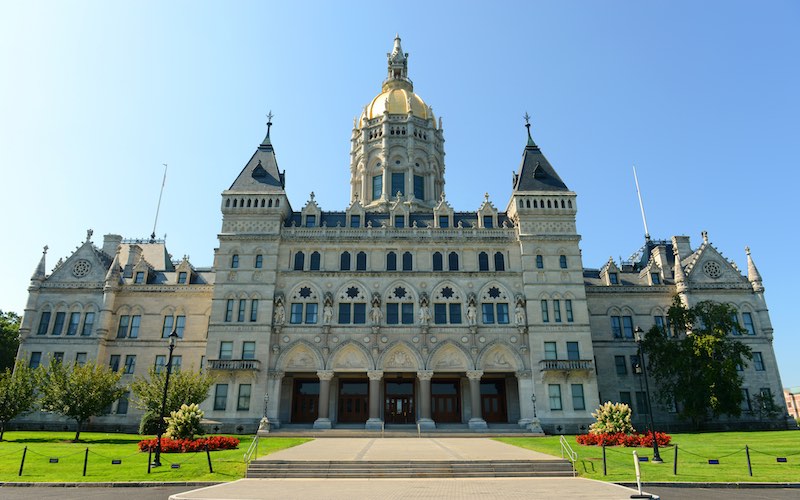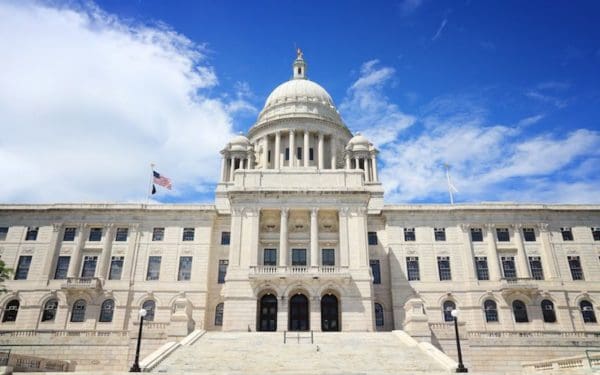
Connecticut's 2023 legislature took a wrong turn in our fight to tackle the waste crisis. Learn what happened and why it matters. Photo: Shutterstock.
Connecticut faces a waste crisis. The cost of trash disposal increased significantly for many towns following the closure of a large and decrepit waste incinerator in Hartford in July 2022. These towns now pay to truck their waste out of state – in some cases as far as Ohio – which is expensive and politically unpopular.
Zero waste policies are the answer to this crisis. Connecticut already has what’s called a “waste hierarchy” that lays out how the state’s trash should be handled. Zero waste policies are consistent with that hierarchy, which emphasizes creating less trash in the first place, recycling whatever we can, and composting food waste. Relying on landfills and trash incinerators should be the last (and least used) option.
But rather than solve our trash problem by embracing innovative, environmentally responsible solutions, Connecticut legislators are entrenching bad waste-management practices. In the just-finished legislative session, the General Assembly passed a bill, H.B. 6664, that represents an undeniable step backward for the health of residents and our environment.
It’s a shame because any investments the state makes in waste infrastructure will determine how much litter and toxic pollution residents must live with for decades to come. Here’s what legislators did and why it matters.
A Missed Opportunity to Manage Trash More Sustainably
During the 2023 Connecticut legislative session, CLF pushed hard for zero waste policies, which are critical in the fight to slow climate change and end environmental injustice. Those policies included reducing waste and holding packaging companies responsible for the tons of plastic they pump into our communities.
We also pushed for the state to invest in facilities that turn food scraps into valuable compost rather than letting them rot in landfills, where they emit climate-damaging methane. And finally, we urged lawmakers to reject attempts to build new harmful incinerators or “advanced recycling” facilities.
Instead, they passed H.B. 6664, which doubles down on polluting infrastructure rather than committing to genuine waste reduction efforts. Despite pushback from environmental advocates, including CLF, the new law paves the way for the Connecticut Green Bank to issue $500 million in bonds to fund new waste-to-energy infrastructure, such as an “advanced recycling” facility.
Advanced recycling facilities use high-heat technologies to burn plastic and other waste. This creates toxic pollution that harms people’s health and the environment. Building such a facility in Connecticut could entrench plastic production and toxic waste in the state for decades. Adding insult to injury, this language was snuck into the bill at the very close of the session, with no opportunity for public comment.
The provision runs directly counter to the stated mission of the Green Bank, which is to “accelerat[e] investment into Connecticut’s green economy to create more resilient, healthier, and equitable communities.”
Not only would an advanced recycling facility be expensive and toxic, but it may also take years to get up and running. In the meantime, Connecticut will keep generating the same amount of trash — and shipping it out of state for some other community to live with.
Facing a Toxic Choice
The alternatives to zero waste policies are grave. Landfills and incinerators release toxic gases that harm our communities. In fact, across the country, communities overburdened by polluting industrial facilities already suffer from disproportionate rates of asthma, heart disease, and reproductive problems. Landfills and incinerators add to the problem.
Given Connecticut’s density and size, some legislators and members of the public see incinerators as preferable to landfills. But both disposal methods have significant long-term consequences for environmental and human health. And incinerator ash (the byproduct of burning waste) still ends up in landfills.
“Advanced recycling” facilities – high-heat waste disposal operations lobbied for by plastic manufacturers – similarly spew damaging pollutants. Such facilities represent nothing more than an attempt to greenwash the burning of plastic and continue to flood our communities with unnecessary plastic products.
Additionally, by investing hundreds of millions in a new facility that must be fed with trash to make money, the state will create a demand for waste. In fact, such a facility here in Connecticut would likely have to import trash from other states to make money. That is precisely the opposite of a sustainable zero waste policy.
Scrapping Food Scraps Diversion
The new law also lacks the ambitious food scrap diversion strategies contemplated at the beginning of the session. Food scraps make up over 20% of Connecticut’s waste. They are either buried in landfills – where they produce climate-damaging methane – or trucked to incinerators. This is a big misstep. Food scraps should be turned into valuable compost, not burned or buried. Legislators should focus on empowering cities and towns with the funding they need to launch local composting programs.
If Connecticut goes down the path laid out by the new law, it means more waste – in expensive incinerators and landfills, in the environment, and potentially, in a so-called “advanced recycling” facility. In turn, this means more climate-damaging emissions and more toxic pollutants released into vulnerable communities and the environment.
What’s Next?
While this legislature took a step in the wrong direction for Connecticut’s people and environment, the fight for a cleaner future—one unpolluted by plastic or wasted food—goes on. The solutions proposed by zero waste advocates are not only cleaner and greener than landfilling, incineration, or “advanced recycling,” but many can also be implemented faster.
CLF will continue to push for genuine solutions to the waste crisis. And we will oppose costly and harmful policies pushed by the fossil fuel, petrochemical, and waste management industries. Stay tuned for opportunities to take action to support investment in genuine waste solutions like food scrap diversion and extended producer responsibility for packaging.



